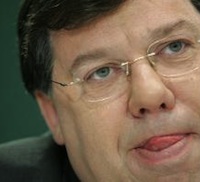
The 26-County Taoiseach Brian Cowen has been strongly criticised following a speech in which he sought to justify his actions as Minister for Finance and Taoiseach while acknowledging that he played a part in the economic crash.
“I believe that if the unprecedented global financial collapse had not happened, there would have been a soft landing for the Irish economy,” he said.
“However, the overvaluation of properties, and related vulnerabilities within banks, put Ireland in a weaker position when we had to face the global crisis.
“I accept that ongoing actions would have been required to address these vulnerabilities even in the absence of the global crisis. To suggest otherwise would, in my opinion, be to bury one’s head in the sand.”
Two banking reports are be published later this month which are expected to throw some light on the policies and practices which give rise to the exponential rise and crash of the property market in recent years, ultimately collapsing the Irish banking system.
Accepting some mistakes were made, Mr Cowen claimed that advice showed that banks appeared to be well enough funded to absorb likely losses from a downturn despite facing vulnerabilities and risks.
In an address to the North Dublin Chamber of Commerce in Dublin City University, he said “no one in the independent authorities ever advised the Government” that the banks would encounter difficulty in the event of a sharp decline in property prices.
Speaking to journalists subsequently, he accused Opposition politicians of “rewriting history” and described himself as a politician who was in touch with people.
“Since this whole crisis has come, there isn’t a day or an evening or a night when I haven’t been concerned and worried about the impact this is having on people,” he said.
Mr Cowen said parliamentary colleagues and others had offered “constructive criticisms” about the need for him “to get out there and communicate our message”.
Asked if he accepted he had made some mistakes, Mr Cowen said: “Yes and in hindsight I’ve set them out.” He said: “We needed a property tax in this country. It was the only way you were going to properly deal with the property issue”. However, he had made “evidence-based” decisions, rather than “top of the head” decisions.
He said he had already made clear he took full responsibility for all his actions and accepted his share of the blame for what had happened subsequently.
Asked if he would apologise, Mr Cowen said: “I just find this a word game for this reason: There’s some facile analysis going around that there was one person that caused all this trouble. Things are a bit more complex than that.”
The former Taoiseach, Berite Ahern, said he agreed the government should have acted earlier, with measures such as withdrawing property-based tax incentives, but faced “fierce pressure” not to do so.
Asked who exerted the pressure, Mr Ahern said: “Developers, owners of sites, areas that didn’t have the developments, community councils, politicians, civic society -- they were forever at us...”.
Labour leader Eamon Gilmore said Cowen was attempting to rewrite history by “whitewashing” the past. “It is a shameful exercise from a Taoiseach who wants to whitewash the past and who has no plan for the future,” he said.
“It is an exercise in self-justification from the man who at best stood idly by, while the economy was taken over by speculators and his party flaunted their connections to the golden circle. It was his party that stood at the apex of a toxic triangle of property developers, bankers and politicians, that destroyed the Irish economy.
“What we are now told is that Brian Cowen knew nothing. He heard no evil, he saw no evil, he spoke no evil. Nobody warned him.”
Mr Gilmore also said Fianna Fail had betrayed the people of Ireland. “Nama [the national bail-out agency] is the greatest safe haven of them all. It is a scheme designed by the golden circle, for the golden circle and delivered in shiny packaging by Fianna Fail.
“And every decision of Government is now subjected to the Nama test. When small businesses are crying out for relief from sky-high rents, the Nama test is applied and even more jobs are lost, rather than threaten the property economy.”
Sinn Fein President Gerry Adams said that the government has failed the people and that what was needed was a radical republican political agenda, based on citizens rights.
He said the claim by the Taoiseach that there were no warnings from the political opposition about the property bubble were false.
“The truth is that Sinn Fein repeatedly raised this issue in the Dail,” he said,
“The government, for its own electoral reasons, and because of the vested interests which it sought to protect, chose to disregard this.
“The government has failed the people.”
Sinn Fein Finance spokesperson Arthur Morgan said “Fianna Fail had tied their policies to electoral gains rather than proper financial and risk management.
“The artificial Celtic Tiger brought in the votes and so Fianna Fail and the Taoiseach himself were happy to keep stoking these fires.”
He pointed to the Dail archives where Sinn Fein deputies are on record as warning against the dependence on property revenues.
“Neither Fianna Fail nor Brian Cowen were willing to heed our warnings and now they are not willing to accept full responsibility for the crisis engulfing this State.”
![[Irish Republican News]](https://republican-news.org/graphics/title_gifs/rn.gif)
![[Irish Republican News]](https://republican-news.org/graphics/title_gifs/harp.gif)

